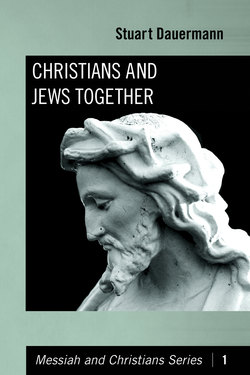Читать книгу Christians and Jews Together - Stuart Dauermann - Страница 6
“Make It Plain”
Оглавление(Habakkuk 2:2)
Although Ezekiel’s vision applies to all Israel, increasingly, Messianic Jews are calling it the New Messianic Jewish Agenda because it undergirds our vision for a new kind of Messianic Judaism.1 For us, all aspects of this agenda are interdependent parts of God’s plan for our people. For example, we are committed to covenantal Jewish life and to faith in Yeshua.2 Neither should be neglected. This kind of Messianic Judaism is built on rediscovered scriptural foundations long buried, yet vital to God’s continuing purposes for our people.
This vision may seem irrelevant to you as a Christian. It may strike you as nothing more than a quaint religious opinion unrelated to or even contradictory of Christian truth as you know it. “But wait!” as the infomercials put it. This vision becomes very exciting once it is seen against the wider context of what God is up to in the world, which mission theologians term the missio dei (the mission of God). Once its context and implications are unpacked, the New Messianic Jewish Agenda changes everything. Exploring this vision and its implications for the Church and for the Jewish people will be one of the big “Aha! moments” of your life. So let’s explore it together, and “make it plain.”
There is nothing timid or conventional about the Kingdom of God nor about new paradigms like this one. C. S. Lewis reminds us that Aslan isn’t a tame lion. South African Mission Theologian David Bosch, who exposed and resisted the evils of apartheid at the risk of his life, was no tame lion himself. He applies paradigm theories native to the field of science to the world of theology and mission, and shows how disruptive they can be:
[A shifting of paradigms] seldom happens without a struggle, however, since scientific communities [and theological traditions] are by nature conservative and do not like their peace to be disturbed, the old paradigm’s protagonists continue for a long time to fight a rearguard action. . . . Proponents of the old paradigm often just cannot understand the arguments of the proponents of the new. Metaphorically speaking, the one is playing chess and the other checkers on the same board.
. . . This explains why defenders of the old order and champions of the new frequently argue at cross-purposes. Protagonists of the old paradigm, in particular, tend to immunize themselves against the arguments of the new. They resist its challenges with deep emotional reactions, since those challenges threaten to destroy their very perception and experience of reality, indeed their entire world.3
Remember my friend Marcia. Not everyone in her church and almost no one on her mission field understood her decisions or appreciated her sacrifice. If you are going to investigate these new ideas, even if they are God’s new ideas, you too may be misunderstood. Despite this risk, I invite you to follow along as I point out a Kingdom controversy most people have yet to consider.
How Great is the Great Commission?
Consider the term, “the Great Commission.” This is the name the Church attaches to Yeshua’s command to “go into all the world and preach the gospel” (Mark 16:15). Few pause to consider that the Bible never refers to the Great Commission by that name. The term “great” is an evaluative term registering the Church’s estimation of the commission. And certainly it is a great commission that has informed and spurred heroic service for nearly two thousand years. But the term is a new one. The first person to use the term “the Great Commission” was probably Dutch missionary Justinian von Welz (1621–1688). And it wasn’t until the nineteenth century that the Great Commission was popularized, by missionary giant Hudson Taylor, who connected the term with Matthew 28:19–20.
No less an authority than the Apostle Paul gives ample evidence that there is something greater than the Great Commission.
But it really shouldn’t be called “the Great Commission,” as though this is God’s final word to His people. No less an authority than the Apostle Paul gives ample evidence that there is something greater than the Great Commission. How so?
The Greater Commission
